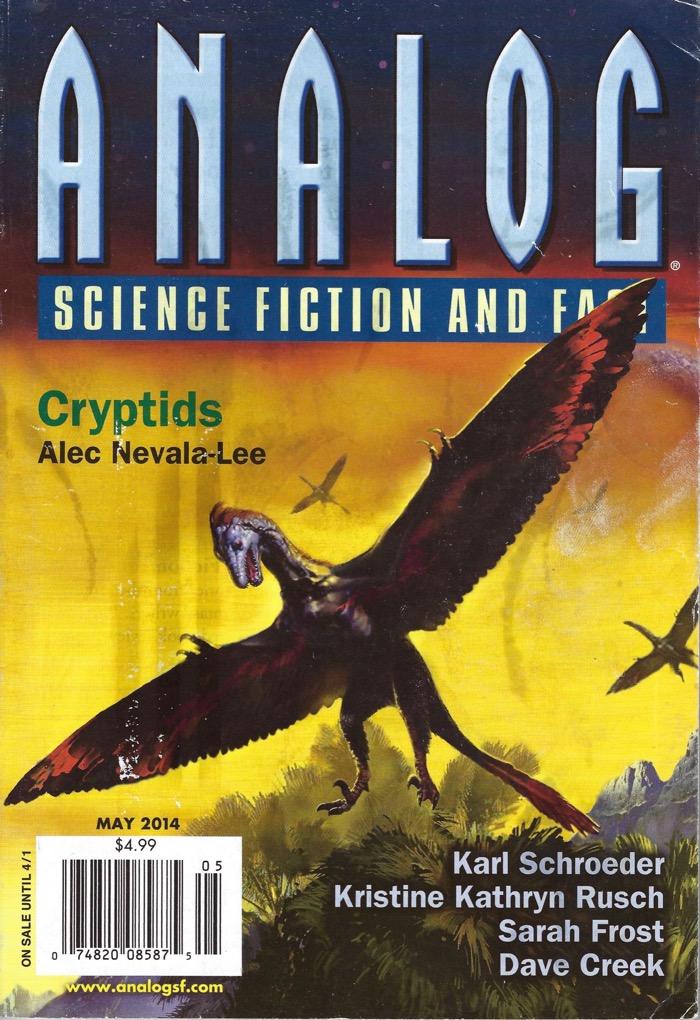Analog Science Fiction and Fact, May 2014
112 pages
I've started to read this issue of Analog three separate times. I'd get partway through Cryptids and life would intrude and I'd set it down for a few months. That's not a knock on Cryptids, which is a fine story. It's just life. I'm glad I finally got back to reading and finishing the magazine. There are some fine stories. I particularly enjoyed Another Man's Treasure and All Things Human.
All Things Human
by Dave Creek
Novelette
Mike Christopher, an artificially created human, is uniquely qualified to help rescue a human who's been captured by the alien Jenregar. He sneaks on board the Jenregar spaceship, disguising himself with pheromones. The Jenregar communicate largely by scent, and a human in their midst is unremarkable as long as he smells like a Jenregar. Mike rescues the prisoner, Jeremy Sheffield, who turns out to hate him because he's an artificial human. (He holds Mike responsible for the fetal atrocities that occurred during the research that culminated in creating him.) Mike, meanwhile, has little respect for Jeremy: Jeremy is a virt-head.
Jeremy and Mike have to work together, because the Jenregar are invading Earth. They've dropped hive colonies onto major cities and mankind is facing annihilation. Mike and Jeremy come up with a plan: suicide missions against the Jenregar. They'll develop viruses, pheromone bombs, etc, and load them onto volunteers who will get themselves captured by the Jenregar. To avoid the Jenregar torture, they'll outfit the volunteers with implanted virt hardware: while they're on suicide missions, they'll be living in their own virtual paradise world.
I like this story. It's unfair to religious people, though. Jeremy is bigoted against Mike on vaguely religious grounds, even though he says he doesn't "belong to an organized religion" himself. I wonder if the author ever considered that religious people have genuine reasons for their beliefs. We're not just using religion as an excuse to justify our icky feelings about something, we have actual real theology and scripture and thousands of years of established beliefs. And no, those beliefs don't include holding people accountable for the sins of their father--or in this case, for the sins of the scientists who created them in a test tube.
Cryptids
by Alec Nevala-Lee
Short story
In Papua New Guinea, researchers investigate the source of an exotic biotoxin found in a particular bird's plumage. Biotoxins are valuable for pharmaceutical research. The bird doesn't produce it, so they figure it must come from something the bird eats, and they want to find the source. They track the birds to a small island, where they are temporarily stranded overnight due to a storm. During the night, they're attacked by giant toxic winged creatures never before seen or cataloged, probably living remnants straight from the age of dinosaurs.
In Perpetuity
by Ellis Morning
Short story
Shortsighted penny-pinching politicians shut down the space program. Ali Nazari and Victor Talbot pay one last visit to the Bibliotheka Alexandrina Selenes: the lunar repository of all mankind's accumulated knowledge. Before the program is shuttered, they add their words to the library, to be immortalized forever in the sterile lunar landscape.
Bodies in Water
by Sarah Frost
Short story
Kay isn't smart, and has some physical defects. Not unusual where she lives--in "Silvaplana, on the coast of what was left of Florida"--but still a rough existence. She catches a mechanical fish, from the times before, and with her dad's help, fixes it and releases it back into the ocean.
Snapshots
by Kristine Kathryn Rusch
Short story
Cleavon grew up in Chicago. His character was formed by violence, racism, and most vividly by the image of Emmett Till's mangled body in a coffin. When he's a grandfather, one of his grandsons creates and releases a virus to all mobile phones, everywhere. If a gun fires, anywhere, "the phones nearby automatically upload everything to the nearest data node." They can't prevent guns from being used, but they can make a difference, "one gun user at a time."
Repo
by Aaron Gallagher
Short story
Elise repos a spaceship, but finds herself fighting for her bounty--and her life--against another bounty hunter who's there for the bounty on the ship's pilot.
Another Man's Treasure
by Tom Greene
Short story
Maggie think's she's struck it rich when she finds an intact CFL bulb in the landfill where she lives and works. But the treasure only draws the attention of Rivits, the local murderous thug. He torches her house (built from reclaimed trash) and forces Maggie to take him to where she found the CFL. Maggie escapes through a drainage pipe at the bottom of the landfill, digs her way out through the forgotten sump, and discovers that she's really struck it rich: her hazmat strip is brilliant with lines indicating a wealth of "heavy metals, rare earths, radioactives. ... A fortune collecting for decades in the bottom of the forgotten sump."
Our New Overlords
by Jerry Oltion
Short-short
Aliens show up to welcome humanity into the Federation. They're rather put out: space travel to other planetary bodies is the bare minimum to qualify for Federation membership, and Earth no longer qualifies. The aliens give an ultimatum: send an ambassador to the Moon, and they'll take the ambassador back to negotiate Federation membership. The various nations fail in their attempts, but a private enterprise manages to send a cat to the Moon, and it's accepted as the ambassador. "Imagine our surprise to learn that cats have a language all their own, one that the aliens could learn."
Lockstep: A Possible Galactic Empire
by Karl Schroeder
Science fact
Locksteps would make it possible for people to live on worlds that would be unable to support life in realtime. And it makes trade with distant worlds possible on a reasonable subjective timespan.
